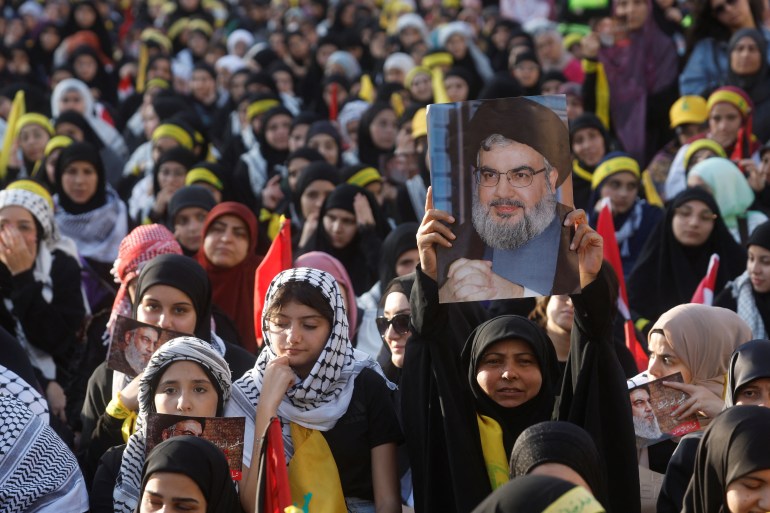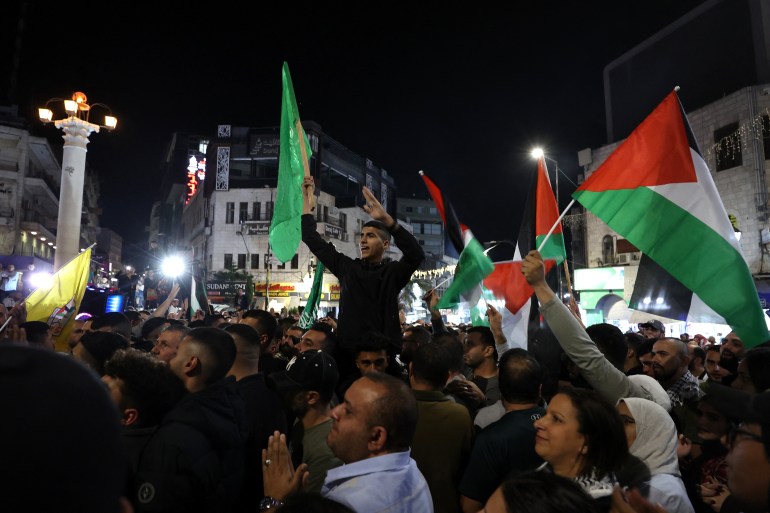EXPLAINER
Nasrallah addressed his followers without disclosing specific details on the next moves Hezbollah could take in the Israel-Gaza war.
Hezbollah leader Syed Hassan Nasrallah addressed his followers on Friday, making his first comments on the Israel-Hamas war since it broke out on October 7.
Fighting between Hezbollah and Israel has escalated along their fraught border in recent weeks. The Lebanese armed group claims to have lost 57 fighters while Israel says that six of its soldiers have been killed in their exchange of fire and missiles. At least six civilians have also been killed.
Many expected Nasrallah to announce the group’s next moves, but he refrained from doing so, instead condemning the Israeli attacks Gaza.
Here are the key highlights from his address:
The October attack was an exclusively Palestinian operation
Nasrallah began the speech by praising “the fallen martyrs” of Hezbollah and the other groups fighting Israel, as well as the civilians killed.
He then also thanked the “strong and brave Iraqi and Yemeni hands who are now involved in this holy war,” in an apparent reference to armed groups in the two countries — including the Houthis in Yemen — who are allies of Hezbollah and have launched attacks against Israel or the United States in recent days.
He described the October 7 Hamas attack on southern Israel, in which more than 1,400 people were killed, as “a big event to shake this oppressive … occupying, usurping Zionist regime and its supporters in Washington and London”.
He said the “operation was 100 percent Palestinian in terms of both decision and execution.”
“That element of secrecy was the linchpin to this emphatic success of the operation, it came as a surprise, shocking surprise, unlike what’s assumed by many.”
Independent of Iran
“This operation has no bearing on any decision or move to be taken by any other faction within the resistance axis,” Nasrallah said, referring to the Iran-led coalition of anti-Israel forces in the region.
“At any point of time when there is a battle, they start to speak about the Iranian nuclear programme, the US-Iran negotiations,” Nasrallah said.

In reality, he claimed, “the secrecy surrounding the entire operation” on October 7 proved that the attack was solely about the Palestinian cause, and unrelated “to any international or regional issue”.
“Since the Iranian revolution … [Iran has] always been openly adopting and supporting resistance factions in Lebanon, Palestine and in the region. However, they do not exercise any form of authority or control over these factions or in their leadership. And what happened … proves this fact.”

US responsible for the war in Gaza
Nasrallah also blamed the US for the continuing violence in Gaza.
“Gaza and the Gazans have been reeling under the brunt of barbaric, ferocious, brutal, ruthless, merciless aerial bombardments,” he said.
He accused the US of remaining “silent” in the face of “the images of thousands of babies and children torn apart in Gaza as a result of the Israeli missiles”.
Nasrallah said the US response exposed the West’s “hypocrisy” on issues like democracy and the rule of law.
“We’re living in a jungle. We all must establish this fact. The United States is totally responsible for the war raging in Gaza, against unarmed defenceless people,” he said.
Hezbollah already in the battle since October 8th
Nasrallah said that Hezbollah entered “the war” the day after the Hamas attack happened.
“Some claim that we are about to engage in the war. I am telling you, we have been engaged in this battle since October 8,” Nasrallah said.
“The Islamic resistance in Lebanon started operation the very next day.”
“What’s taking place on our front is very important and significant,” said Nasrallah, claiming that the conflict on the border with Israel was the hottest it had been since 1948.
“Yet I assure you this will not be the end. This will not be sufficient.”
Asks for more from Arab nations
Nasrallah also made a call to other Arab countries to help Gaza.
“We are calling on the Arab and Muslim states to cut off oil and gas and food supplies from Israel,” Nasrallah said, echoing a demand made by Iran earlier this week.
He said that he hoped that “at a point of time, the whole humanity will listen to the sound of reason”.

Emily Foster is a globe-trotting journalist based in the UK. Her articles offer readers a global perspective on international events, exploring complex geopolitical issues and providing a nuanced view of the world’s most pressing challenges.








